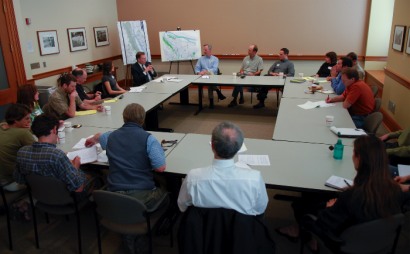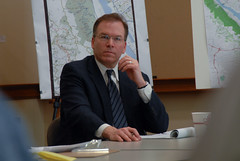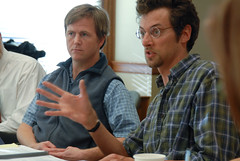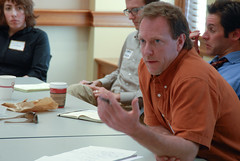
(Photos © J. Maus)
After making it clear that he wants to move the dialogue about urban, off-road biking forward, City Commissioner Nick Fish got a crash course on the topic at a roundtable discussion held in City Hall last night.
Fish came to the meeting prepared with questions and he busily took down notes from the group of assembled experts and advocates. Around the table were 18 representatives ranging from city staffers from the Parks and Transportation bureaus, bike shop owners, and leaders of local non-profit advocacy groups like the International Mountain Bicycling Assocation (IMBA), Forest Park Conservancy (FPC), the Portland United Mountain Pedalers (PUMP) and the Audubon Society of Portland.
Judging from who was around the table, it was clear that Commissioner Fish is making this a real priority (versus just having a meeting to satisfy constituents). Before asking each person to introduce themselves and share their thoughts about the issue, Fish said that as the new commissioner in charge of parks he has been “struck” by the “passion in the biking community and the interest in this issue in particular.” Fish admitted that he doesn’t have a personal connection to mountain biking but that he called the meeting to “be educated” and to scope out the forthcoming off-road trail study project planned by the Portland Parks Bureau in June.
Fish also added that he was aware that there are differing perspectives on this issue. “I want to get past some old stalemates,” he said, “but I want to do so thoughtfully.”
“I’ve ridden Wildwood Trail [a popular hiking trail in Forest Park that is off-limits to bikes] many times…but it was 30 years ago, before it was illegal.”
— Jay Graves, Bike Gallery owner, Co-Chair of the Bicycle Master Plan update and Oregon State Parks commissioner
During introductions, Sellwood Cycle Repair owner Erik Tonkin said he thinks there’s a “real opportunity for Portland to capitalize on the excitement around the Cross Crusade [which has more participants than any other cross series in the world] and the general interest for cycling around town.”
Jim Labbe, who was representing the Audubon Society of Portland, stressed that his interest was in making sure that Portland’s commitments to stewardship of its natural areas was upheld as the number of park users grows.
The Forest Park Conservancy had four people in the meeting; executive director Michelle Bussard, stewardship director Stephen Hatfield and board members John Runyon and Barbara Nelson.
During her introductory remarks, Bussard said the Forest Park mountain biking issue is about “mindfulness” and “how we balance users needs and take care of the ecology of the park.”
Other notables in the room were Bike Gallery owner and Oregon State Parks Commissioner Jay Graves, BTA executive director Scott Bricker, lawyer Mark Ginsberg (representing the City of Portland Bicycle Advisory Committee), PUMP and Gateway Green board member Tom Archer, and citizen advocate Frank Selker.
Selker can take a lot of credit for this meeting coming together. It was his plan and vision that sparked a renewed interest in the topic of more bike access in Forest Park and the public’s reaction to Selker’s plan caught the attention of Commissioner Fish. Introducing himself, Selker said for him, the issue is “about love and money.” “The park needs love,” he explained, “it needs people to support bonds, to pull ivy, etc…” Selker also stressed that he feels the $50,000 recently committed to the cause by Universal Cycles is “just the tip of the iceberg”.
Tom Archer, a very hard-working advocate who is closely involved with just about every off-road biking issue right now, said he loves to ride and wants to “see that opportunity given to more people.” “As a user group,” he continued, “we’re underserved. It’s not one’s fault, but we have some catching up to do.”
My favorite line of the night came from Bike Gallery owner Jay Graves (who, in addition to being a state parks commissioner is also the Co-Chair of the city’s Bicycle Master Plan Update effort). Graves told the group he had a confession to make; “I’ve ridden Wildwood Trail [a popular hiking trail in Forest Park that is off-limits to bikes] many times…but it was 30 years ago, before it was illegal.”
Once introduced to everyone around the table, Fish asked a series of prepared questions.
He asked Chris Bernhardt, a natural surface trail expert with Alta Planning (formerly with IMBA), to share examples of what other cities are doing with urban trails and how Portland can learn from them. He asked Frank Selker; “When we talk about ‘off-road biking’, what are we talking about? Can you flesh it out for me?”
Fish also wanted to learn more about Gateway Green (he had a meeting about that project just prior to this meeting), the city’s current inventory of singletrack trails (1/3 of a mile in Forest Park and 5-7 miles on Powell Butte, according to Parks staffer Emily Roth), the number of mountain bikers in Portland (he asked Bricker this, but he said no one really knows the number).
Several times during the meeting, Fish asked the group if there was any “low-hanging fruit” that he and his office could go after (politicians love low-hanging fruit). Selker suggested implementing a trail-sharing system in Forest Park which he noted “a lot of cities have had good success with.” This would entail allowing bikes on certain trail sections at certain times of the day.
Jim Labbe with the Audubon Society — who has often disagreed with Selker and other supporters of increased mountain bike access in Forest Park — immediately spoke up to that suggestion; “I wouldn’t call that the low-hanging fruit. To me, the opportunity is not trying to open up trail that are designed for hikers, and that are overused already.” Labbe made the point that existing hiking trails were not designed for cycling and that “there would be a lot of controversy” and “would not move us forward” if trail-sharing was attempted.
Labbe said that Portland currently has shared trails in Powell Butte and that, “it hasn’t been seamless”. He also stressed – by referring to our story on urban trails from the National Bike Summit — that “trail design is critical” in making shared trails work.
Labbe, who is a regular rider himself, would rather focus on projects like Gateway Green or on, “retrofitting and redesigning specific fire lane, powerline corridors, and trail segments for new single track trails”.
Another topic that came up was the Forest Park Mountain Biking White Paper. This project, which many people at last night’s meeting have been working on for over a year now, was kick-started by the Forest Park Conservancy. FPC board member John Runyon said they’re about a month away from completion and that the group is “pretty close to consensus” on several short and long-term actions outlined in the document.
Advocate and PUMP board member Tom Archer has been closely involved with the white paper project. He has told me in the past that the effort was “languishing” and that at one point, staffers from the Parks Bureau had walked away from it altogether due to disagreements about various issues (this seems to have been resolved of late now that Commissioner Fish has made it clear he wants to move the issue forward).
Another topic Fish wanted to understand better was the extent of existing conflicts between trail users in Forest Park. The consensus around the table seemed to be that anecdotal evidence points to a lot of conflicts, but that no one has any real numbers about it. Hannah Kuhn, a senior policy advisor to Fish spoke up to say, as a regular walker in the park, her biggest conflicts are with off-leash dogs.
Labbe urged that the City of Portland needs to “recognize the need to manage recreational impacts.” He said that use has expanded rapidly but that none of the recommendations about how to manage that growth have been implemented.
Another perspective came from Bricker with the BTA. “Sometimes,” he said, “you just have to try something new and see what happens.” Bricker suggested the idea of an entire day where mountain biking is allowed in Forest Park. It wasn’t a seriously considered idea, but his point was that perhaps it’s time to shake things up and not fall back on the status quo (in transportation planning terms, he said, the equivalent would have been to “just keep building freeways.”)
There were several key themes/issues that emerged last night that will be interesting to follow as this conversation continues.
Should the city focus on a system-wide approach to find more off-road trail opportunities, or focus efforts on Forest Park access? Erik Tonkin and Frank Selker emphasized that many people have come to the table, and there is broad support from the community and local businesses for Forest Park specifically (Tonkin doesn’t want Forest Park to “get lost in the shuffle” in the citywide approach). The issue however, is that some feel Forest Park will be too much of a battle (and potentially controversial) so they’d rather find other places for bikes to go.
There’s also the balance between short-term gains and longer-term projects. Fish knows politically that short-term gains are valuable and off-road trail advocates feel like Portland has waited long enough and has demonstrated enough demand from the community to make some gains happen sooner rather than later.
One idea that everyone can agree on is that more park users, while they may pose a strain on trails and must be managed carefully, will only make the pie bigger and bring in more resources and much-needed investment (both financial and in terms of sweat equity) into the park system.
The people at this meeting will likely morph into an off-road trail/Forest Park bike access advisory committee. Fish and his staff plan to keep in touch and re-assemble the group to continue discussing these issues into the future. Fish also knows that he’ll need the support of the advocates around the table at last night’s meeting. He shared that there’s a $700 million tab of “unmet needs” in his parks system and that his office is considering the public’s willingness to pass a bond measure between now and 2011 to help pay for it.
Besides this issue of more urban singletrack trails, Fish is really establishing himself as a much more vocal champion for bikeway network trails and multi-use paths than his predecessor, Commissioner Saltzman (I have already written more about Fish in his first few months than I did about Saltzman over several years). Fish called the Gateway Green project “an historical opportunity”, he is very interested to push the Sullivan’s Gulch Trail, and he recently got a tour of the North Portland Greenway Trail that will someday connect the Steel Bridge to St. Johns via the riverfront.
The lines between bikeways, trails, and parks continue to be blurred here in Portland. Not only is the local mountain bike advocacy conversation maturing quickly, but the BTA is looking into how local parks can integrate more favorably with bike boulevards and Safe Routes to Schools, and there is more momentum for expanding and funding regional trails now than ever before (thanks to Metro especially).
As the commissioner in charge of parks who has made his support of bicycling very clear, Nick Fish will be an important part of this momentum going forward. Fish reminded the group last night that he’ll be up for re-election next year and I think he realizes his involvement with these issues will garner him broad community support and ultimately, political success.




